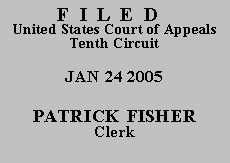

| DAVID BRYAN WILLIAMS, |
04-5080, 04-5081 |
| v. | |
| UNITED STATES OF AMERICA, | 87-CR-174-C,87-CR-175-C, |
I. Background
In 1987, Williams was indicted on three counts of bank fraud and one count of making a false statement to a bank. The cases were consolidated for plea and sentencing in the Northern District of Oklahoma. Williams pled guilty to all counts, but failed to appear for sentencing and was subsequently indicted for "bail jumping."
Williams spent the next fourteen years as a fugitive, and when authorities arrested him in 2002, he pled guilty to the "bail jumping" charge. He was sentenced to five years for each of the three bank fraud charges, two years for the false statement charge, and one year for bail jumping, with all sentences to be served consecutively. He was also ordered to pay a fine of $100,000 and restitution in the sum of $11,653,448.98.
Williams appealed his conviction; however, counsel for Williams filed an Anders brief and moved to withdraw. See Anders v. California, 386 U.S. 738, 744 (1967) (permitting counsel who considers an appeal to be wholly frivolous to advise the court of that fact, request permission to withdraw from the case and submit a brief referring to portions of the record that arguably support the appeal). In response, Williams contended that he received ineffective assistance of counsel and that his guilty pleas were not knowing and voluntary. This court examined the proceedings as required by Anders, 386 U.S. at 744, and concluded that the issues raised on appeal were wholly frivolous. United States v. Williams, No. 02-5175, 2003 WL 21652634 at **2 (July 15, 2003) (unpublished opinion). We affirmed Williams's conviction and dismissed his claim of ineffective assistance of counsel. Id. at **2.
On June 16, 2003, Williams filed a motion to suspend payment on his restitution and fines until he was released from incarceration. The district court denied the motion on June 23, 2003, and Williams did not appeal. On March 8, 2004, Williams filed a motion to reconsider.(1)
The district court denied his motion.
On appeal, Williams additionally asserts that (1) he was "coerced" into pleading guilty to his crimes; (2) his trial counsel failed to adequately prepare for his sentencing hearing; (3) the clerk's office at the district court deliberately failed to properly file his motions; (4) the district court had an improper conflict of interest; and (5) he was denied due process.
II. Discussion
A. The Motion to Reconsider
Under 18 U.S.C. § 3572 and 18 U.S.C. § 3664, a monetary fine or monetary restitution may be imposed on a criminal defendant by a district court. Both provisions permit the district court to "adjust the payment schedule, or require immediate payment in full, as the interests of justice require," but both provisions also require a defendant to notify the court of a material change in the defendant's economic circumstances. 18 U.S.C. §§ 3572(d)(3), 3664(k). Williams has not shown that he has experienced the requisite change in circumstances. Furthermore, even if Williams met this requirement, the language of "adjust[ing] the payment schedule" clearly does not compel the district court to authorize an 18-year suspension of all payments.
We review the district court's denial of the motion to reconsider for an abuse of discretion. See United States v. Castillo-Garcia, 117 F.3d 1179, 1197 (10th Cir. 1997) (overruled on other grounds by U.S. v. Ramirez-Encarnacion, 291 F.3d 1219 (10th Cir. 2002) (en banc n.1)). Finding no abuse of discretion, we affirm the district court's denial of Williams's motion to reconsider.
B. Additional Claims
Most of Williams's remaining claims have already been addressed by this court in earlier proceedings. In Williams's previous appeal, this court held that his claim to have been coerced into pleading guilty "lack[ed] merit," and that his claim of effective counsel could not be brought in a direct appeal. Williams at **1. We decline to revisit these two claims in this appeal. Williams's remaining three claims are frivolous and have no grounding in law or fact.
Accordingly, the district court's denial of the motion to reconsider is AFFIRMED.
Entered for the Court
Timothy M. Tymkovich
Circuit Judge
*. This order is not binding precedent, except under the doctrines of law of the case, res judicata, and collateral estoppel. The court generally disfavors the citation of orders; nevertheless, an order may be cited under the terms and conditions of 10th Cir. R. 36.3.
2. After examining the briefs and the appellate record, this three-judge panel has determined unanimously that oral argument would not be of material assistance in the determination of this appeal. See Fed. R. App. P. 34(a); 10th Cir. R. 34.1(G). The cause is therefore ordered submitted without oral argument.
1.There was initially some confusion as to the nature of Williams's March 8, 2004 filing. He styled it a "Motion to Adjust Payment Schedule" and a "Notice of Change of Status," but the district court concluded that the filing was properly considered a motion to reconsider the district court's June 23, 2003 order, and the motion was denied on May 11, 2004. Williams's current appeal before this court does not clearly indicate that it is based on this denial. However, because Williams proceeds pro se, we shall construe his filing liberally and view it as an appeal of the district court's denial of the motion to reconsider. See Haines v. Kerner, 404 U.S. 519, 520-21 (1972), Ledbetter v. City of Topeka, 318 F.3d 1183, 1187 (10th Cir. 2003).